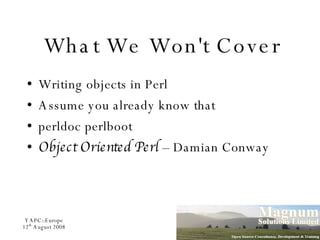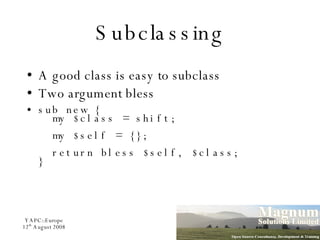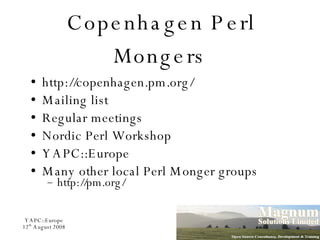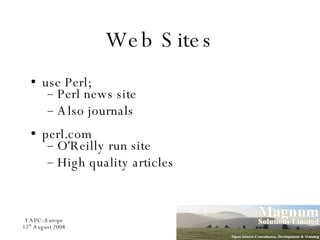Perl Teach-In (part 2)
- 1. Perl Teach-In A One Day Perl Tutorial Dave Cross Magnum Solutions Ltd [email_address]
- 3. Object Oriented Perl How to design objects Design Patterns Inside-Out Objects Moose
- 4. What We Won't Cover Writing objects in Perl Assume you already know that perldoc perlboot Object Oriented Perl – Damian Conway
- 5. How To Design Objects Designing Objects is hard - OO Barbie Very few hard and fast rules A few heuristics A bit of experience A bit of guesswork
- 6. Prototyping Plan to throw one away; you will, anyhow - Fred Brooks (The Mythical Man Month) You won't get it right first time Unless you're very lucky Make it easy to refactor your code Unit tests Source code control
- 7. Subclassing A good class is easy to subclass Two argument bless sub new { my $class = shift; my $self = {}; return bless $self, $class; }
- 8. Constructor Tip You'll often see code like this sub new { my $thing = shift; my $class = ref $thing || $thing; return bless {}, $class; } Don't do that
- 9. Confusing Methods The previous constructor can be called as a class method or an instance method my $obj = MyClass->new; my $obj2 = $obj->new; Potentially confusing What does $obj->new do? Clone?
- 10. Separate Methods Class method creates a new, empty, object sub new { my $class = shift; return bless {}, $class; }
- 11. Separate Methods Instance method creates a copy of an object sub clone { my $self = shift; # warning! simplified! Buggy! return bless { %$self }, ref $self; }
- 12. Multiple Constructors In Perl an constructor is just a subroutine new is not a keyword You can have as many constructors as you want They can be called whatever you want But using new for the standard constructor is recommended
- 13. new is Not a Keyword People coming from other languages often write my $obj = new MyObject; This is potentially dangerous See "perldoc perlobj" for gory details Most of the time it will be fine But avoid it my $obj = MyObject->new;
- 14. Overriding Methods Subclasses are created so that methods can be overridden Or so that new methods can be added Make it as easy as possible to subclass your classes Create many methods
- 15. Case Study I needed to create a new graph type for GD::Graph Waterfall graph Based on bar chart Subclassing GD::Graph::bars
- 16. Bar Chart
- 17. Waterfall Chart
- 18. Things to Override Colour choosing pick_data_clr Legend drawing ??? The author didn't envisage my use case I ended up copying far too much code
- 19. Be Consistent A good object design is consistent Similar things act in similar ways Good candidates for programming standards Some examples
- 20. Accessor vs Mutator Or "getter vs setter" Some people like one method foo Works out what to do based on parameters Some people like get_foo and set_foo Pick one and stick to it
- 21. Mutator Return Values What does a mutator return? The old value The new value The object Nothing Pick one and stick to it
- 22. Don't Always Subclass Not all relationships are "isa_a" Sometimes "has_a" is more appropriate If you're connecting to a database Don't subclass DBI Have a DBI attribute
- 23. Design Patterns Perl does have some design patterns Some of them come from Design Patterns Some are more "Perlish"
- 24. Factory Object Call constructor on one class Constructor works out what is the most appropriate class to use Returns an object of the appropriate class Often not the same class as the constructor was called on E.g. DBI->connect
- 25. AudioFile::Info There are many Perl modules for reading tags from MP3 files MP3::ID3Lib MP3::Info MP3::Tag And a couple for reading tags from Ogg Vorbis files Ogg::Vorbis::Header Ogg::Vorbis::Header::PurePerl
- 26. Using AudioFile::Info AudioFile::Info simplifies reading tag information from audio files One syntax across numerous modules $song = AudioFile::Info->new('a_song.mp3'); print $song->title, ' - ', $song->artist; $song2 = AudioFile::Info->new('a_song.ogg'); print $song2->title, ' - ', $song2->artist; print ref $song; # AudioFile::Info::MP3::Tag print ref $song2; # AudioFile::Info::Ogg::Vorbis::Header
- 27. AudioFile::Info->new Works out which kind of file it has been given Works out the best installed module to handle that kind of file Loads the appropriate module Calls the constructor Returns the new object
- 28. Singleton Pattern Highlander pattern “ There can be only one” Only ever one instance of the class If an instance has been created then use that Otherwise create new instance
- 29. Singleton Class package MySingleton; my $single; sub new { my $class = shift; unless ($single) { $single = bless {}, $class; } return $single; }
- 30. More Design Patterns See Perl Design Patterns Wiki http://perldesignpatterns.com/
- 31. Inside-Out Objects Standard Perl objects are usually based on hashes bless { name => 'Dave', email => '[email protected]' }, 'Person'; Two problems People can access attributes directly People can add attributes easily
- 32. Accessing Attributes $person->{name} = ''; Avoids any checks in the mutator method sub set_name { my $self = shift; my $name = shift; croak "Name can't be empty" unless $name; $self->{name} = $name; }
- 33. Adding Attributes No checks on adding entries to the hash $person->{nick} = 'davorg'; Our class knows nothing about this attribute No check on mistyped attributes $person->{NAME} = 'dave';
- 34. Inside-Out Objects Inside-out objects solve both of these problems An object is no longer a hash containing attributes Each attribute is a package variable A hash Key is unique identifier for object Value is the attribute value for that object
- 35. Example package Person; use strict; my %name; my %email; sub new { my $self = bless {}, shift; $name{$self} = shift; $email{$self} = shift; return $self; }
- 36. Example (cont) sub get_name { my $self = shift; return $name{$self}; } sub set_name { my $self = shift; my $name = shift; croak "name cannot be empty" unless $name; $name{$self} = $name; }
- 37. How It Works The object is still a hash reference Still blessed into the correct class But it contains no data All data is stored in the lexical variable hashes Hence the name - Inside-Out
- 38. Solving Problems People can access attributes directly Attributes are now stored in lexical variables Only visible from within package All access is through methods People can add attributes easily Attribute names are now the names of lexical variables use strict ensures that variable names can't be mistyped
- 39. One Improvement The object is still a blessed hash But we never put anything into it So it may as well be a blessed scalar sub new { my $self = bless \(my $dummy), shift; $name{$self} = shift; $email{$self} = shift; return $self; } No anonymous scalars
- 40. One New Problem When our objects go out of scope, the blessed scalar ceases to exist But the values still exist in the attribute hashes Need a DESTROY method sub DESTROY { my $self = shift; delete $name{$self}; delete $email{$self}; }
- 41. More Stuff Need to handle inheritance Automation of inside-out objects Class::Std Class::InsideOut Object::InsideOut See also Perl Best Practices (Damian Conway)
- 42. Moose A complete modern object system for Perl 5 Based on experiments with Perl 6 object model Built on top of Class::MOP MOP - Meta Object Protocol Set of abstractions for components of an object system Classes, Objects, Methods, Attributes An example might help
- 43. Moose Example package Point; use Moose; has 'x' => (isa => 'Int', is => 'ro'); has 'y' => (isa => 'Int', is => 'rw'); sub clear { my $self = shift; $self->{x} = 0; $self->y(0); }
- 44. Understanding Moose There's a lot going on here use Moose Loads Moose environment Makes our class a subclass of Moose::Object Turns on strict and warnings
- 45. Creating Attributes has 'x' => (isa => 'Int', is => 'ro') Creates an attribute called 'x' Constrainted to be an integer Read-only accessor has 'y' => (isa => 'Int', is => 'rw')
- 46. Defining Methods sub clear { my $self = shift; $self->{x} = 0; $self->y(0); } Standard method syntax Uses generated method to set y Direct hash access for x
- 47. Subclassing package Point3D; use Moose; extends 'Point'; has 'z' => (isa => 'Int'); after 'clear' => sub { my $self = shift; $self->{z} = 0; };
- 48. Subclasses extends 'Point' Similar to use base Overwrites @ISA instead of appending has 'z' => (isa = 'Int') Adds new attribute 'z' No accessor function - private attribute
- 49. Extending Methods after 'clear' => sub { my $self = shift; $self->{z} = 0; }; New clear method for subclass Called after method for superclass Cleaner than $self->SUPER::clear()
- 50. Creating Objects Moose classes are used just like any other Perl class $point = Point->new(x => 1, y => 2); $p3d = Point3D->new(x => 1, y => 2, z => 3);
- 51. More Moose Only scratching the surface Many more options Moose is well worth investigating perldoc Moose::Cookbook::*
- 53. Configuration Files Can you just add...? Users are never satisfied Always want something changed Most users won't edit code Most users can be trained to edit config files Move as much as possible into config files
- 54. Configuration in Code This is bad #!/usr/bin/perl use strict; use warnings; ## Configuration my $debug = 0; my $email = '[email protected]'; my $output_file = 'output.txt'; ## DO NOT EDIT BEYOND THIS POINT
- 55. Why is This Bad? Don't trust 'em Something will get broken Code doesn't match what is in source code control Recipe for disaster Don't do it
- 56. Windows INI Files [debugging] debug=1 verbose=0 Most users will understand this Provide them with a dry-run option Tell them what would happen Parse with Config::IniFiles
- 57. XML <debugging> <debug>1</debug> <verbose>0</debug> </debugging> or <debugging debug="1" verbose="0" /> Too complicated Parse with XML::Simple (or XML::LibXML / XML::XPath)
- 58. YAML --- debugging: debug: 1 verbose: 0 Looks a bit like INI file Human-readable Still give them a dry-run option Parse with YAML
- 59. Swiss Army Config Parser Config::Auto "Magical config file parser" Guesses where your config file is Guesses what format it is in And usually gets it right
- 60. Other Places Environment variables Command line options Parse with Getopt::Long Need to establish an order of precedence $debug = defined $opt{debug} ? $opt{debug} : defined $ENV{DEBUG} ? $ENV{DEBUG} : defined $conf{debug} ? $conf{debug} : 0;
- 61. Web 2.0 Perl
- 62. Web 2.0 Perl Mashups Data Feeds APIs Ajax Don't need to be using Ruby on Rails CPAN modules can help
- 63. Reading Web Feeds A lot of data available as web feeds RSS / Atom But which version of RSS RDF vs RSS
- 64. Parsing RSS XML::RSS use XML::RSS; my $rss = XML::RSS->new; $rss->parsefile('myfeed.rss'); foreach (@{$rss->{items}}) { print $_->{title}, "\n"; print $_->{link}, "n"; } Supports RSS 0.9, 0.91, 1.0 and 2.0 Most of the versions you'll see in the wild
- 65. Parsing Atom XML::Atom use XML::Atom::Feed; my $atom = XML::Atom::Feed->new('myatom.xml'); foreach ($atom->entries) { print $_->title, "\n"; print $_->link, "\n"; } Cleverer than XML::RSS Handles things like autodiscovery my @feeds = XML::Atom::Feed->find_feeds ('http://example.com/');
- 66. Parsing RSS and Atom XML::Feed uses XML::RSS or XML::Atom as appropriate Allows code to handle all web feeds. use XML::Feed; my $feed = XML::Feed->parse('feed.xml'); print $feed->title; foreach ($feed->entries) { print $_->title; }
- 67. Parsing Broken Feeds Not all XML feeds are valid XML This is bad! You should complain bitterly to the provider But until it is fixed you can use XML::Liberal Slightly badly named What it parses isn't XML
- 68. Mashing Up Web Feeds Plagger - Pluggable RSS/Atom Aggregator Huge distribution, installs half of CPAN Dozens of small plugins Single program ( plagger ) YAML configuration file
- 69. Web Services APIs Many web sites expose web services REST, RPC, SOAP HTTP request Parse response Usually XML Or JSON
- 70. Web Services on CPAN Many CPAN modules for handling web services Wrappers around LWP or WWW::Mechanize Parse response into data structures or objects Make dealing with web services very easy
- 71. CPAN Examples Net::Backpack Net::Amazon::* Flickr::API Geo::Google Geo::Coder::Yahoo
- 72. API Keys Many of these sites will monitor the requests you make Use an API key Apply for the key on the web site Use the key in every request you use
- 73. API Example: Flickr Get details of photos Details at http://www.flickr.com/services/api/ Many methods Perl module gives low level access Need to know the API pretty well
- 74. Flickr API #!/usr/bin/perl use strict; use warnings; use Flickr::API; my $flickr = Flickr::API->new({ key => 'your key goes here' }); my $response = $flickr->execute_method( 'flickr.photos.getRecent', { per_page => 2 } ); print $response->content;
- 75. Flickr API Results <?xml version="1.0" encoding="utf-8" ?> <rsp stat="ok"> <photos page="1" pages="500" perpage="2" total="1000"> <photo id="525440809" owner="65666164@N00" secret="3ab099b893" server="223" farm="1" title="00760052" ispublic="1" isfriend="0" isfamily="0" /> <photo id="525440801" owner="47391132@N00" secret="d24451edc8" server="1009" farm="2" title="041070 14 29B" ispublic="1" isfriend="0" isfamily="0" /> </photos> </rsp>
- 76. APIs Without CPAN You might find an API that doesn't have a CPAN module Easy to do it yourself Read the API documentation LWP / WWW::Mechanize Parse the response (Release to CPAN)
- 77. Ajax You don't need to be using Ruby on Rails to use AJAX AJAX is largely just Javascript With a server-side application Which can be written in Perl
- 78. Ajax on CPAN CGI::Ajax Creates AJAX code in your CGI program output Similar to Ruby on Rails AJAX helpers JSON Perl module for creating JSON Common format for AJAX data exchange Serialised Javascript Objects A lot like YAML
- 80. Further Information Some suggestions for places to go for further information Web sites Books Magazines Mailing lists Conferences
- 81. Copenhagen Perl Mongers http://copenhagen.pm.org/ Mailing list Regular meetings Nordic Perl Workshop YAPC::Europe Many other local Perl Monger groups http://pm.org/
- 82. Web Sites use Perl; Perl news site Also journals perl.com O'Reilly run site High quality articles
- 83. Web Sites Perl Monks Best web site for Perl questions Many Perl experts The Perl directory http://perl.org/ Lists of many Perl-related sites
- 84. Books Some recent Perl books Perl Best Practices - Damian Conway Advanced Perl Programming - Simon Cozens Perl Hacks - chromatic, Conway & Poe Intermediate Perl - Schwartz, foy & Phoenix Mastering Perl - brian d foy
- 85. More Books Higher Order Perl - Mark-Jason Dominus Minimal Perl - Tim Maher Pro Perl Debugging - Richard Foley & Joe McMahon Perl & LWP - Sean M Burke Updated online edition http://lwp.interglacial.com/ See http://books.perl.org/
- 86. Magazines The Perl Review http://www.theperlreview.com/ Randal's monthly columns Linux Magazine SysAdmin
- 87. Mailing Lists Many mailing lists devoted to Perl topics See http://lists.cpan.org/
- 88. Conferences The Open Source Convention Portland 21-25 July 2008 YAPC Chicago 16-18 June 2008 Copenhagen 13-15 August 2008 Brazil, Asia, Israel, Australia One-Day Perl Workshops See http://yapc.org/
- 89. The End That's all folks Any questions?

![Perl Teach-In A One Day Perl Tutorial Dave Cross Magnum Solutions Ltd [email_address]](https://image.slidesharecdn.com/perl-teachin-part-2-1207062416741706-5/85/Perl-Teach-In-part-2-1-320.jpg)






















































![Windows INI Files [debugging] debug=1 verbose=0 Most users will understand this Provide them with a dry-run option Tell them what would happen Parse with Config::IniFiles](https://image.slidesharecdn.com/perl-teachin-part-2-1207062416741706-5/85/Perl-Teach-In-part-2-56-320.jpg)
































